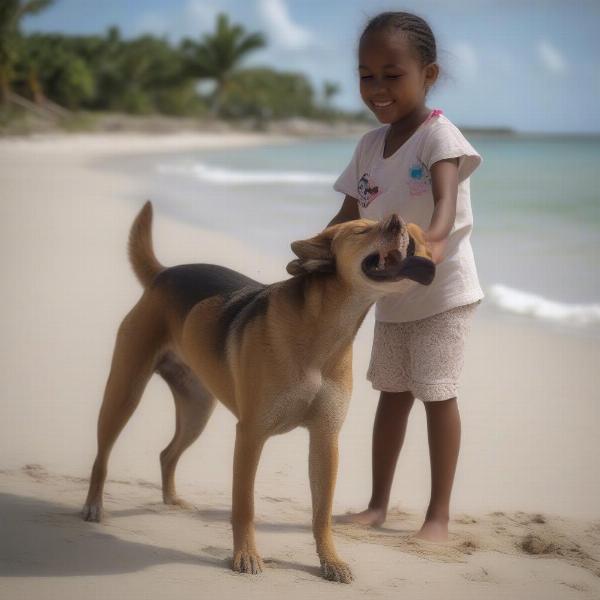Caribbean dogs evoke images of sun-drenched beaches and carefree island life. But what exactly constitutes a “Caribbean dog”? This guide delves into the unique world of island canines, exploring their diverse origins, common characteristics, and the joys and challenges of caring for these resilient and charming companions.
Understanding the “Caribbean Dog”
The term “Caribbean dog” doesn’t refer to a specific breed, but rather encompasses a diverse population of dogs found throughout the Caribbean islands. These dogs are often mixed breeds, descendants of dogs brought to the islands by European colonizers, mixed with indigenous dogs and other breeds introduced over time. This fascinating mix has resulted in a resilient and adaptable canine population, often characterized by short coats, medium size, and a friendly, though sometimes independent, nature. While some islands have unique local types, such as the Potcake dog of the Bahamas and Turks and Caicos, the overall picture is one of incredible diversity.
Common Traits and Characteristics
While appearances vary, Caribbean dogs often share certain traits:
- Short, smooth coats: Adapted to the tropical climate.
- Medium size: Generally ranging from 20 to 60 pounds.
- High energy levels: They often enjoy running and playing.
- Resilient and adaptable: Accustomed to island life.
- Friendly and social: Though some can be independent.
Of course, individual personalities and temperaments can vary greatly, so it’s important to spend time getting to know a Caribbean dog before welcoming them into your home.
 Caribbean Dog Playing with Children
Caribbean Dog Playing with Children
Caring for a Caribbean Dog
Caring for a Caribbean dog is similar to caring for any mixed breed dog, but there are some specific considerations due to their background and the environment they often come from:
Health Considerations
- Parasites: Regular preventative treatment for fleas, ticks, and heartworm is crucial in tropical climates.
- Heat tolerance: Ensure access to shade and fresh water, especially during the hottest parts of the day.
- Skin issues: Short coats can be susceptible to sunburn and other skin irritations.
Training and Socialization
- Early socialization: Expose your Caribbean dog to a variety of people, animals, and environments early on to promote a well-adjusted personality.
- Positive reinforcement training: Reward-based training methods are most effective.
- Consistency: Establish clear rules and boundaries and maintain consistent training practices.
Nutrition
- High-quality dog food: Choose a food formulated for active dogs.
- Portion control: Avoid overfeeding to prevent obesity.
- Fresh water: Always ensure access to fresh, clean water.
Bringing a Caribbean Dog Home
If you’re considering adopting a Caribbean dog, be prepared for a loving and energetic companion. Research local rescue organizations or shelters in the Caribbean if you are looking to adopt directly from the islands. Remember, adopting a dog is a significant commitment. Be sure you are prepared to provide a loving, stable home for your new furry friend.
Conclusion
Caribbean dogs are a unique and captivating group of canines. Their resilience, adaptability, and friendly nature make them wonderful companions. By understanding their specific needs and providing proper care, you can ensure a long and happy life for your Caribbean canine companion.
FAQ
- What is the average lifespan of a Caribbean dog? Like most mixed breeds, Caribbean dogs can live for 10-15 years with proper care.
- Are Caribbean dogs good with children? Many Caribbean dogs are friendly and social, making them good family pets, but individual temperaments vary.
- Do Caribbean dogs require a lot of exercise? Most Caribbean dogs have moderate to high energy levels and benefit from regular exercise.
- What are the common health problems in Caribbean dogs? Parasites, skin issues, and heat-related illnesses are common concerns in tropical climates.
- How can I find a Caribbean dog to adopt? Research rescue organizations and shelters in the Caribbean or contact breed-specific rescues in your area.
Related Articles
About ILM Dog
ILM Dog is your comprehensive online resource for all things dog-related, offering expert advice on dog breeds, health, training, nutrition, and much more. We are dedicated to providing dog owners worldwide with the information they need to provide the best possible care for their canine companions. From choosing the right breed to understanding their unique health needs, ILM Dog provides practical and trustworthy guidance. Contact us at [email protected] or +44 20-3965-8624 for more information.